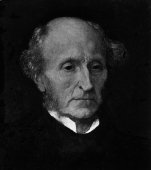 (BIOGRAPHY:
John Stuart Mill was a British philosopher and economist. He received a
rigorous education under his father, James Mill (1773-1836), and Jeremy Bentham
(1748-1832), who were close friends and together had founded utilitarianism. John Stuart
Mill's own philosophy, influenced by his wife, Harriet Taylor, developed into a more
humanitarian doctrine than that of utilitarianism's founders: he was sympathetic to
socialism, and was a strong advocate of women's rights and such political and social
reforms as proportional representation, labor unions, and farm cooperatives. In logic he
formulated rules for the process of induction, and he stressed the method of empiricism as
the source of all knowledge. On Liberty (1859) is probably his most famous work.
Among his other books are Principles of Political Economy (1848), Utilitarianism
(1863), and his celebrated Autobiography (1873). One of the most important liberal
thinkers of the 19th century, Mill strongly influenced modern economics, politics, and
philosophy.)
(BIOGRAPHY:
John Stuart Mill was a British philosopher and economist. He received a
rigorous education under his father, James Mill (1773-1836), and Jeremy Bentham
(1748-1832), who were close friends and together had founded utilitarianism. John Stuart
Mill's own philosophy, influenced by his wife, Harriet Taylor, developed into a more
humanitarian doctrine than that of utilitarianism's founders: he was sympathetic to
socialism, and was a strong advocate of women's rights and such political and social
reforms as proportional representation, labor unions, and farm cooperatives. In logic he
formulated rules for the process of induction, and he stressed the method of empiricism as
the source of all knowledge. On Liberty (1859) is probably his most famous work.
Among his other books are Principles of Political Economy (1848), Utilitarianism
(1863), and his celebrated Autobiography (1873). One of the most important liberal
thinkers of the 19th century, Mill strongly influenced modern economics, politics, and
philosophy.)

Mill's moral theory is called
utilitarianism, which is a consequentialist theory of ethics. By that I mean that
utilitarians believe that the rightness or wrongness of an action is a function of the consequences
of performing (or failing to perform) that action. Where consequentialists differ is
on their beliefs about what consequences ought to be attended to when making a
determination about the morality of a given action. Mill, in the selection for today,
argues that happiness is the critical factor.
I. Statement of Utilitarian
theory
A. "...actions are right
in proportion as they as they tend to promote happiness; wrong as they tend to promote the
reverse of happiness. By happiness is intended pleasure and the absence of pain; by
unhappiness, pain and the privation of pleasure." [185]
1. Explain the following
claim of Mill: "pleasure and freedom from pain are the only things desirable as
ends." Does this mean that we only desire pleasure?
B. Why, according to Mill,
does this theory (the one Mill is proposing) "excite in many minds...inveterate
dislike"? [185]What do people find objectionable about this theory?
1. Mill responds to this
charge by attacking the objection itself, arguing that it is making assumptions about the
sorts of pleasures humans are capable of experiencing that utilitarians do not share.
Explain Mill's response.
C. Explain the different
types of pleasure Mill believes humans are capable of. How do these pleasures differ from
one another?
D. Explain the following
quote: "It is better to be a human being dissatisfied than a pig satisfied; better to
be Socrates dissatisfied than a fool satisfied. And if the fool, or the pig, are of a
different opinion, it is because they only know their own side of the question."[187]
II. Proof of the principle of
utility
A. How can we prove the
utilitarian doctrine that happiness is the only thing desirable?
B. Explain why utilitarianism
is NOT a version of ethical egoism. (Ethical egoists hold that one is only
obligated to perform those actions that increase one's own happiness).
